Unit6 I'm going to study computer science. Section A 1a-3b 知识点串讲课件(共13张PPT)
文档属性
| 名称 | Unit6 I'm going to study computer science. Section A 1a-3b 知识点串讲课件(共13张PPT) | 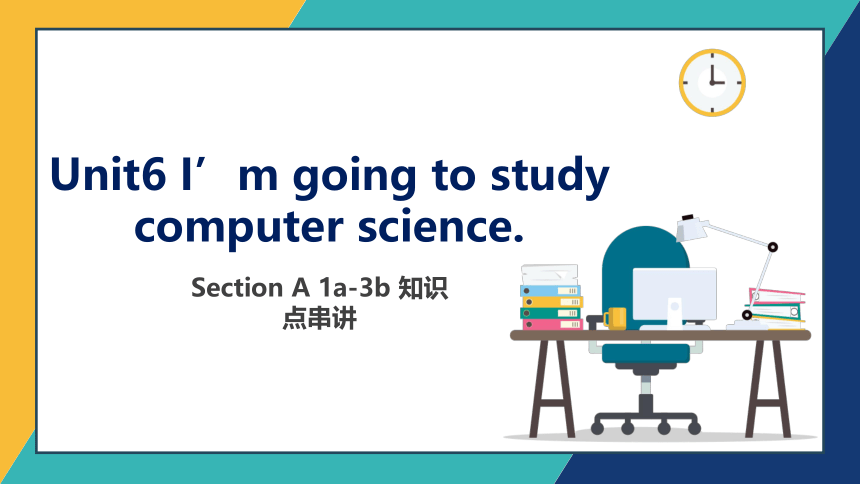 | |
| 格式 | zip | ||
| 文件大小 | 430.0KB | ||
| 资源类型 | 教案 | ||
| 版本资源 | 人教新目标(Go for it)版 | ||
| 科目 | 英语 | ||
| 更新时间 | 2022-10-10 15:32:52 | ||
图片预览

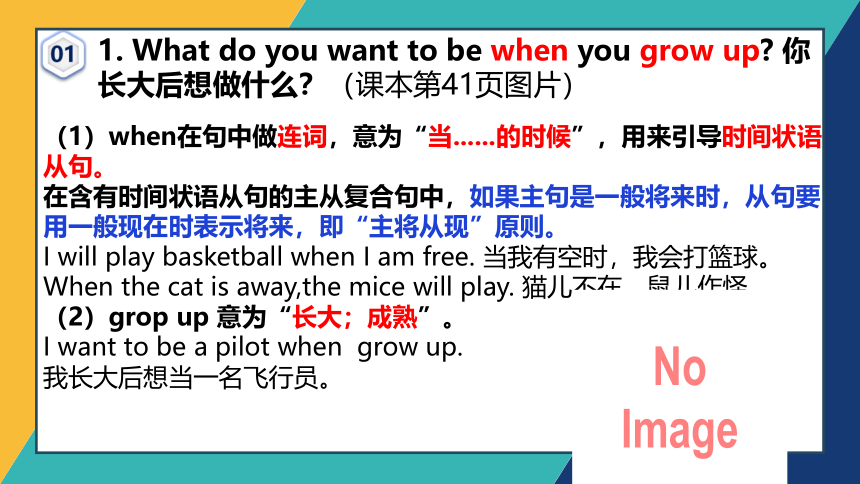
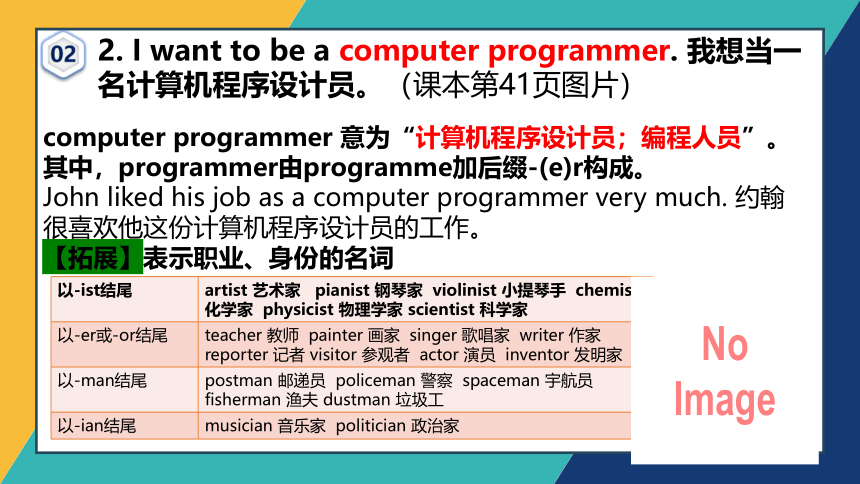
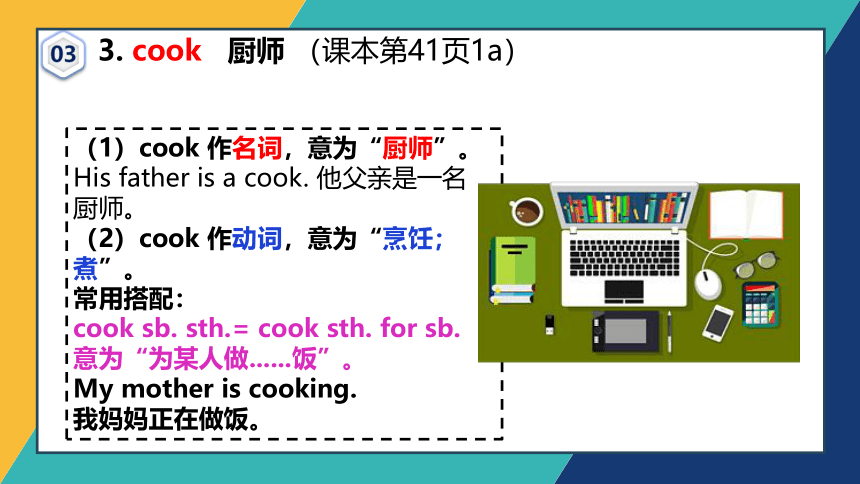
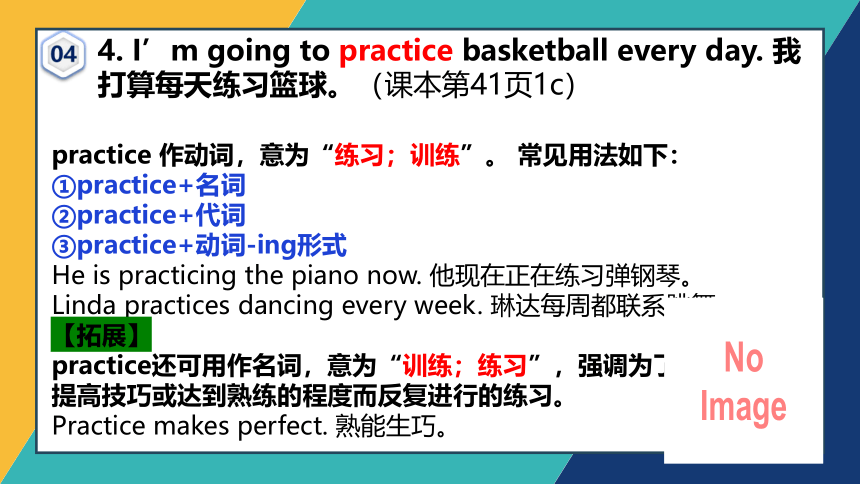
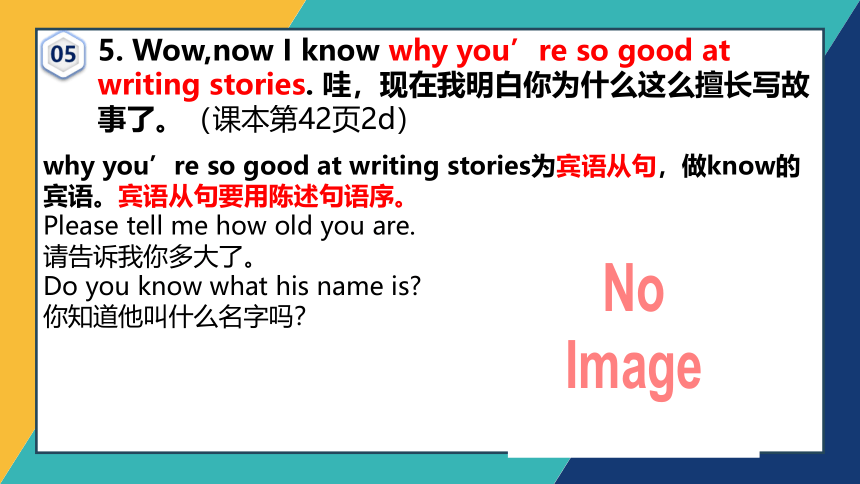
文档简介
(共13张PPT)
Unit6 I’m going to study computer science.
Section A 1a-3b 知识点串讲
01
1. What do you want to be when you grow up 你长大后想做什么?(课本第41页图片)
(1)when在句中做连词,意为“当......的时候”,用来引导时间状语从句。
在含有时间状语从句的主从复合句中,如果主句是一般将来时,从句要用一般现在时表示将来,即“主将从现”原则。
I will play basketball when I am free. 当我有空时,我会打篮球。
When the cat is away,the mice will play. 猫儿不在,鼠儿作怪。
(2)grop up 意为“长大;成熟”。
I want to be a pilot when grow up.
我长大后想当一名飞行员。
02
2. I want to be a computer programmer. 我想当一名计算机程序设计员。(课本第41页图片)
computer programmer 意为“计算机程序设计员;编程人员”。其中,programmer由programme加后缀-(e)r构成。
John liked his job as a computer programmer very much. 约翰很喜欢他这份计算机程序设计员的工作。
【拓展】表示职业、身份的名词
以-ist结尾 artist 艺术家 pianist 钢琴家 violinist 小提琴手 chemist 化学家 physicist 物理学家 scientist 科学家
以-er或-or结尾 teacher 教师 painter 画家 singer 歌唱家 writer 作家 reporter 记者 visitor 参观者 actor 演员 inventor 发明家
以-man结尾 postman 邮递员 policeman 警察 spaceman 宇航员 fisherman 渔夫 dustman 垃圾工
以-ian结尾 musician 音乐家 politician 政治家
3. cook 厨师 (课本第41页1a)
03
(1)cook 作名词,意为“厨师”。
His father is a cook. 他父亲是一名
厨师。
(2)cook 作动词,意为“烹饪;煮”。
常用搭配:
cook sb. sth.= cook sth. for sb.
意为“为某人做......饭”。
My mother is cooking.
我妈妈正在做饭。
04
4. I’m going to practice basketball every day. 我打算每天练习篮球。(课本第41页1c)
practice 作动词,意为“练习;训练”。 常见用法如下:
①practice+名词
②practice+代词
③practice+动词-ing形式
He is practicing the piano now. 他现在正在练习弹钢琴。
Linda practices dancing every week. 琳达每周都联系跳舞。
【拓展】
practice还可用作名词,意为“训练;练习”,强调为了
提高技巧或达到熟练的程度而反复进行的练习。
Practice makes perfect. 熟能生巧。
05
5. Wow,now I know why you’re so good at writing stories. 哇,现在我明白你为什么这么擅长写故事了。(课本第42页2d)
why you’re so good at writing stories为宾语从句,做know的宾语。宾语从句要用陈述句语序。
Please tell me how old you are.
请告诉我你多大了。
Do you know what his name is
你知道他叫什么名字吗?
06
6. Well, I’m going to keep on writing stories,of course. 嗯,当然,我打算继续写故事。(课本第42页2d)
keep on doing sth. 意为“继续做某事”,其后可接非延续性动词(表示反复),也可接延续性动词。
She kept on raising her hand. 她反复拒收。
【辨析】 keep on doing sth. 与 keep doing sth.
He kept on working until midnight though he was tired. 尽管他累了,但是他一直工作到午夜。
The boy kept watching the traffice at the gate. 这个男孩在门口不停地观察来往的车辆。
keep on doing sth. 表示动作的反复,强调动作与动作之间有时间间隔,以及某人不怕困难或警告,坚持做某事的决心。
keep doing sth. 表示连续不断的动作,后某一动作的持续状态。
07
7. My parents want me to be a doctor,but I’m not sure about that. 我父母想让我当一名医生,但我不确定。(课本第42页2d)
be sure about 意为“确信;对......有把握”,相当于be sure of,后接名词,代词或动词-ing形式。
She is sure about/of success. 她确信会成功。
【拓展】
①“be sure+to do sth.”意为”一定做某事;肯定做某事“,表示说话人的推测和判断。主语可以是人,也可以是物。
He is sure to succeed. 他一定会成功。
②“be sure+that 从句”意为“肯定......;有把握......”,主语必须是人。其中that可省略。
I am sure (that)he will come. 我确信他会来。
08
8. Just make sure you try your best. 你只要确保尽最大努力就行。(课本第42页2d)
make sure意为“确保;查明”,常用于祈使句中。其常见用法如下:
①make sure+动词不定式
②makre sure+that从句
③make sure+of短语
I make sure to finish this work in two weeks.
我确保在两周内完成这项工作。
I just want to make sure that everything is OK.
我只想确保一切都好。
We must make sure of his safety.
我们必须确保他的安全。
09
9. He’s going to take acting lessons. 他打算上表演课。(课本第43页3a)
take acting lessons 意为“上表演课”。在此短语中,take......lessons意为“上......课”。
acting作定语,修饰lessons。
I take acting lessons twice a week. 我每周上两次表演课。
【拓展】
与其类似的短语有:
take singing lessons 上声乐课
take guitar lesssons 上吉他课
take piano lessons 上钢琴课
10
10. I‘m going to study medicine at a university. 我打算上大学学医。(课本第43页3b)
(1)medicine 不可数名词,意为“药;医学”。
常用短语:take medicine ,意为“吃药”。
I like Chinese Medicine. 我喜欢中医学。
Take your medicine,Lucy. 露西,把药吃了。
(2)university 名词,意为“(综合性)大学,高等学府”。
His uncle works in a university. 他的叔叔
在一所大学工作。
11
11. I’m going to write articles and send them to magazines and newspapers. 我打算写文章,然后向杂志社和报社投稿。(课本第42页2d)
send 动词,意为“邮寄;发送”,其过去式为sent。 常用结构: send sb. sth.= send sth. to sb. 意为“送/寄给某人某物”。
She sent me a Christmas card. =She sent a Christmas card to me. 她给我寄了一张圣诞贺卡。
【拓展】
send构成的短语:
①send for 派人去请
②send away 撵走,开除
③send up 发射
④send off 邮寄;发送
Thank you
Unit6 I’m going to study computer science.
Section A 1a-3b 知识点串讲
01
1. What do you want to be when you grow up 你长大后想做什么?(课本第41页图片)
(1)when在句中做连词,意为“当......的时候”,用来引导时间状语从句。
在含有时间状语从句的主从复合句中,如果主句是一般将来时,从句要用一般现在时表示将来,即“主将从现”原则。
I will play basketball when I am free. 当我有空时,我会打篮球。
When the cat is away,the mice will play. 猫儿不在,鼠儿作怪。
(2)grop up 意为“长大;成熟”。
I want to be a pilot when grow up.
我长大后想当一名飞行员。
02
2. I want to be a computer programmer. 我想当一名计算机程序设计员。(课本第41页图片)
computer programmer 意为“计算机程序设计员;编程人员”。其中,programmer由programme加后缀-(e)r构成。
John liked his job as a computer programmer very much. 约翰很喜欢他这份计算机程序设计员的工作。
【拓展】表示职业、身份的名词
以-ist结尾 artist 艺术家 pianist 钢琴家 violinist 小提琴手 chemist 化学家 physicist 物理学家 scientist 科学家
以-er或-or结尾 teacher 教师 painter 画家 singer 歌唱家 writer 作家 reporter 记者 visitor 参观者 actor 演员 inventor 发明家
以-man结尾 postman 邮递员 policeman 警察 spaceman 宇航员 fisherman 渔夫 dustman 垃圾工
以-ian结尾 musician 音乐家 politician 政治家
3. cook 厨师 (课本第41页1a)
03
(1)cook 作名词,意为“厨师”。
His father is a cook. 他父亲是一名
厨师。
(2)cook 作动词,意为“烹饪;煮”。
常用搭配:
cook sb. sth.= cook sth. for sb.
意为“为某人做......饭”。
My mother is cooking.
我妈妈正在做饭。
04
4. I’m going to practice basketball every day. 我打算每天练习篮球。(课本第41页1c)
practice 作动词,意为“练习;训练”。 常见用法如下:
①practice+名词
②practice+代词
③practice+动词-ing形式
He is practicing the piano now. 他现在正在练习弹钢琴。
Linda practices dancing every week. 琳达每周都联系跳舞。
【拓展】
practice还可用作名词,意为“训练;练习”,强调为了
提高技巧或达到熟练的程度而反复进行的练习。
Practice makes perfect. 熟能生巧。
05
5. Wow,now I know why you’re so good at writing stories. 哇,现在我明白你为什么这么擅长写故事了。(课本第42页2d)
why you’re so good at writing stories为宾语从句,做know的宾语。宾语从句要用陈述句语序。
Please tell me how old you are.
请告诉我你多大了。
Do you know what his name is
你知道他叫什么名字吗?
06
6. Well, I’m going to keep on writing stories,of course. 嗯,当然,我打算继续写故事。(课本第42页2d)
keep on doing sth. 意为“继续做某事”,其后可接非延续性动词(表示反复),也可接延续性动词。
She kept on raising her hand. 她反复拒收。
【辨析】 keep on doing sth. 与 keep doing sth.
He kept on working until midnight though he was tired. 尽管他累了,但是他一直工作到午夜。
The boy kept watching the traffice at the gate. 这个男孩在门口不停地观察来往的车辆。
keep on doing sth. 表示动作的反复,强调动作与动作之间有时间间隔,以及某人不怕困难或警告,坚持做某事的决心。
keep doing sth. 表示连续不断的动作,后某一动作的持续状态。
07
7. My parents want me to be a doctor,but I’m not sure about that. 我父母想让我当一名医生,但我不确定。(课本第42页2d)
be sure about 意为“确信;对......有把握”,相当于be sure of,后接名词,代词或动词-ing形式。
She is sure about/of success. 她确信会成功。
【拓展】
①“be sure+to do sth.”意为”一定做某事;肯定做某事“,表示说话人的推测和判断。主语可以是人,也可以是物。
He is sure to succeed. 他一定会成功。
②“be sure+that 从句”意为“肯定......;有把握......”,主语必须是人。其中that可省略。
I am sure (that)he will come. 我确信他会来。
08
8. Just make sure you try your best. 你只要确保尽最大努力就行。(课本第42页2d)
make sure意为“确保;查明”,常用于祈使句中。其常见用法如下:
①make sure+动词不定式
②makre sure+that从句
③make sure+of短语
I make sure to finish this work in two weeks.
我确保在两周内完成这项工作。
I just want to make sure that everything is OK.
我只想确保一切都好。
We must make sure of his safety.
我们必须确保他的安全。
09
9. He’s going to take acting lessons. 他打算上表演课。(课本第43页3a)
take acting lessons 意为“上表演课”。在此短语中,take......lessons意为“上......课”。
acting作定语,修饰lessons。
I take acting lessons twice a week. 我每周上两次表演课。
【拓展】
与其类似的短语有:
take singing lessons 上声乐课
take guitar lesssons 上吉他课
take piano lessons 上钢琴课
10
10. I‘m going to study medicine at a university. 我打算上大学学医。(课本第43页3b)
(1)medicine 不可数名词,意为“药;医学”。
常用短语:take medicine ,意为“吃药”。
I like Chinese Medicine. 我喜欢中医学。
Take your medicine,Lucy. 露西,把药吃了。
(2)university 名词,意为“(综合性)大学,高等学府”。
His uncle works in a university. 他的叔叔
在一所大学工作。
11
11. I’m going to write articles and send them to magazines and newspapers. 我打算写文章,然后向杂志社和报社投稿。(课本第42页2d)
send 动词,意为“邮寄;发送”,其过去式为sent。 常用结构: send sb. sth.= send sth. to sb. 意为“送/寄给某人某物”。
She sent me a Christmas card. =She sent a Christmas card to me. 她给我寄了一张圣诞贺卡。
【拓展】
send构成的短语:
①send for 派人去请
②send away 撵走,开除
③send up 发射
④send off 邮寄;发送
Thank you
同课章节目录
- Unit 1 Where did you go on vacation?
- Section A
- Section B
- Unit 2 How often do you exercise?
- Section A
- Section B
- Unit 3 I'm more outgoing than my sister.
- Section A
- Section B
- Unit 4 What's the best movie theater?
- Section A
- Section B
- Unit 5 Do you want to watch a game show?
- Section A
- Section B
- Unit 6 I'm going to study computer science.
- Section A
- Section B
- Unit 7 Will people have robots?
- Section A
- Section B
- Unit 8 How do you make a banana milk shake?
- Section A
- Section B
- Unit 9 Can you come to my party?
- Section A
- Section B
- Unit 10 If you go to the party, you'll have a grea
- Section A
- Section B
